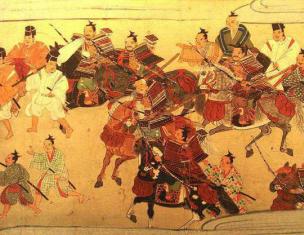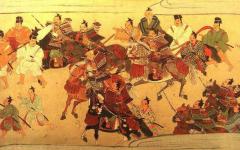Who do you think was the richest man in human history? Put aside stereotypes: this is not Rothschild or Rockefeller, and certainly not Bill Gates. Ironically, the most incredible wealth belonged to a medieval black emperor named Mansa Musa. Converted to current exchange rates, his fortune is estimated at 400 billion dollars, and it was enough to cause a protracted economic crisis for half the world - a real Black Lord of his time.
Who was the richest man in history
Mansa Musa (aka Kanku Musa) was a 14th-century ruler of the Mali Empire and, not surprisingly, a man with an unusual destiny. To understand how some tribal leader turned out to be richer than all the emperors and popes, you need to shed a little light on the situation. The fact is that by 1312, that is, by the time Musa ascended the throne, the state of Mali was not a third-rate backwater, but a completely prosperous power and was not called an “empire” for nothing. Thanks to the campaigns of conquest, it became larger than the whole Western Europe in size, and in terms of development and culture, it was not inferior to most of its countries. One can imagine an alternative history in which it was Mali who entered the gunpowder age and captured half the world, but everything turned out as it turned out.
The remaining descriptions of Mansa Musa are incredibly contradictory, even when given by the same witness. The historian and traveler al-Omari talks about the emperor as follows:
“This king is the greatest of the black Muslim kings. His country is the most extensive, with the most a large army. The Malian king is the most powerful of them, the greatest of kings in wealth, the most beautiful in his circumstances, the most victorious in relation to enemies and the most powerful of all to do good deeds.”

However, the same al-Omari, talking about appearance, describes one of the most influential rulers of the contemporary world as an incredibly ridiculous, dressed like a farcical jester king and is amazed at his blatant bad taste:
“The royal attire was distinguished by the fact that the king lowered the end of the turban cloth over his forehead and that his trousers were sewn from 20 stripes; no one else would dare to dress like that... The Sultan of that country sits in his palace on a large platform, on the sides of which there are elephant tusks ... His golden weapon is nearby ... Behind him is a crowd of sons of the kings of his country ... One of them holds a silk umbrella with a golden pommel and a bird.”
How Mansa Musa became an emperor as rich as Satan

Mansa Musa not only ascended the throne and began to rule: even with succession to the throne, he managed to get into history. His great-uncle, Sundiata Keita, was the leader of the Mandingo tribe, an ascetic of Islam and incidentally the first emperor of Mali. Speaking without exaggeration, for the history of West Africa he was like Caesar, Emperor Constantine and Napoleon rolled into one. Contrary to the typical situation when the heirs turn out to be mediocrities and degenerates, his descendants developed the empire and increased its wealth. And so it was, at least, right up to Emperor Abubakar II, who also tried to become the successor of the great cause, but everything turned out very strange.
Now it is no longer clear to what extent Abubakar II was an adequate ruler (at least he did not destroy the empire, and thank you for that). But somewhere in the year 1310-1311, he assembled a huge fleet (from half a thousand to several thousand ships) and set off on a reconnaissance and conquest campaign, from which he did not return.

- Empire of Mali.
Now all this looks incredibly strange: why does the emperor personally sail into the open spaces? Atlantic Ocean, to unknown lands, and even with a battle fleet? Of course, there are speculative theories that he learned about the existence of America or that Columbus dreamed of finding a roundabout route to India. However, it is more likely that Abubakar dreamed of invading one of the neighboring countries, but the fleet was lost in a storm.
His successor at the time of sailing was Kanku Musa, the future crowned Mansa Musa. After a couple of years, it was already clear to everyone that the unexpectedly disappeared fleet would not return, which means that the one who was left in charge remained the emperor. Our hero inherited a huge country, inhabited by dozens of nationalities, which had already become famous throughout the Ecumene as a source of gold, copper, salt and exotic goods. Moreover, it is still unknown what exactly made the country richer.
The reign of Mansa Musa: how not to interfere with people's lives

Mali was famous as one of the centers of Islamic culture, while treating religion completely without fanaticism (unlike the current situation in these same lands). The top of the country, following the emperors, hastened to convert to fashionable Islam, while the rest professed ancient pagan and animist cults without any problems. Gold here lay almost on the surface, salt mines produced high-quality, expensive salt, and human labor did not cost a penny. The ruler's power rested on the belief in his divinity, and his army was truly imperial - 100 thousand soldiers and 10 thousand horsemen - a crushing military force at that time.
At the same time, the richest man in history was smart enough to understand that the most important thing now is not new victories and expansion, but peace and at least some semblance of stability. There were many tribes around, but Mali did not capture them, but included them in the orbit of her power. For example, Mansa Musa did not attack the Dialonke people, who lived in a territory incredibly rich in precious metals. Instead, he hired the entire tribe to guard and hunt them. The Dialonke themselves mined and gave away most of their own gold, sincerely believing that they had fooled Musa around their finger - isn’t this a success? And so it happened with most tribes: the empire itself was huge, but its sphere of influence was even larger.

- You probably remember this emperor from Civilization IV and V.
It was under Mansa Musa that Mali achieved its greatest prosperity and power. No stories about how exactly he ruled and what he did in his post have been preserved - but not at all because of the years ago: quite a lot is known about the policies and administrative decisions of Musa’s grandfather, Sundiat. Overall, our hero was the best embodiment of the idea that if something works, then don't touch it and everything will be fine.
Morals in Mali were far from the ideal of Islamic morality, and they could be called very free. When, shortly after the death of Mansa Musa, he arrived here great traveler Ibn Battuta, he was extremely amazed by two things: the wasteful wealth of the local nobility and the frivolity of local women. They turned out to be both insanely hot and headstrong. Self-willed in the sense that they considered men equal to themselves and allowed themselves to have lovers for entertainment. A man coming home could find his wife straddling one of his “buddies”, react calmly, say hello, apologize for the disturbance and leave. Wives did not interfere with their husbands having fun on the side, and husbands did not interfere with their wives. For Ibn Battuta, brought up in Arab traditions, this seemed unthinkable, and he was thrown into a bashful fever at the mere thought of such customs.
The Crazy Pilgrimage of Mansa Musa

But even the wisest ruler, who allows everything to develop in its own way, will definitely have his own quirk. For Mansa Musa, his fix was the desire to show the whole world that Mali is not an African outback, but a rich region and an empire that must be taken into account by everyone. In other words, it seemed to him not enough to be the richest king in the world; he wanted the whole world to know about it. In 1324, after 12 years of rule, Mansa Musa went on Hajj, that is, the pilgrimage to Mecca that every Muslim is required to make. But we understand that the richest man in the world couldn't just go there like a mere mortal.
Then begins what can safely be called His Majesty’s PR campaign. For the sake of the hajj, all the juice was squeezed out of the country: on the emperor’s campaign, 80 thousand servants of both sexes accompanied him - the rulers of the countries through which Mansa Musa passed, not without reason, feared that he had come to launch an invasion under the pretext of a pilgrimage. This whole horde lined up into a huge caravan, loaded with supplies, goods, gifts, weapons and, of course, gold.

At the head of the column were 500 slaves, each of whom leaned on a staff of gold. Mansa Musa himself freed one of these slaves every day, thereby showing his generosity to his people. According to modern estimates, the ruler of Mali took at least 12,750 tons of gold on this journey, every grain of which he, as a result, distributed along the way. He returned home not even empty, but with huge debts.
On the way, the emperor did not mortify his flesh at all, like a righteous man. Thanks to the postal system, even in the middle of the Sahara, the emperor enjoyed fresh fish and fruit. But most of all, his contemporaries remembered his indulgence in the whimsical whims of his wife, Nieriba Conde, who also participated in the Hajj. Right in the middle of the desert, she felt sick, and then Musa ordered the creation of a swimming pool in this place: eight thousand workers worked all night, and by the next morning the empress and five hundred of her concubines were already frolicking in the man-made lake, while the servants were organizing something in it with the help of wineskins. like a jacuzzi. All this looks like anything but a modest pilgrimage to holy places.
Advice from an experienced: how to spend 12 tons of gold and get into debt

- Image of Mansa Musa on a Portuguese map.
On his journey to Mecca and back, Mansa Musa squandered gold as if it were the dung on which his future greatness would grow. Having reached Egypt, with whose ruler he was on good terms, the emperor presented gold to literally every official in the country; the gifts given to the big shots in Cairo were generally obscenely chic. Everyone was delighted with the black ruler: the stories he told were passed on from mouth to mouth, and the whole city remembered the most generous pilgrim with tears of joy in their eyes even twelve years after the events.
On a caravan full of gold, they began to make rude and disgusting money: upon seeing blacks, merchants broke unimaginable sums, and begging from Mansa Musa could become a source of instant wealth. As a result, before reaching Mecca, the emperor spent all his gold reserves and even managed to get into debt. Instead of a holiday of kindness and generosity, hostility and hostility towards the Egyptians began to appear: Musa realized that he had been cruelly deceived.
And this is where the most interesting part of the gold story begins. There turned out to be so much of it that all these gifts simply collapsed the precious metals markets, first in Egypt, and then throughout the Mediterranean. A terrible inflation and financial crisis began, gold depreciated for at least the next 12 years (ironically, the Egyptians idolized Musa for the same amount of time). In a sense, the ruler of Mali managed to take revenge on the excessively greedy owners who had fleeced the guest to the bone.

A year later, Mansa Musa, perhaps no longer the richest man in the world, returned to his homeland. In his absence, imperial warlords seized the kingdom of Songhai, and with it a powerful trading hub. Perhaps it was only because of this that Mali was able to withstand the loss of its gold and even flourish again under the leadership of the emperor. In addition, he brought from the campaign many talented people: poets, architects, theologians - and with them a huge library of books, which made Mali a bastion of culture and scientific thought.
However, the incredible dynastic success of the country was interrupted by Mansa Musa: after a series of great rulers, Musa’s descendants came, who managed to ruin and squander literally everything acquired by the empire. His son completely renounced Islam and, in spite of his orthodox parent, switched back to paganism - isn’t this an evil mockery of fate?
Reading time: 6 min.
In 2017, Bloomberg announced its annual ranking of the five hundred richest people in the world. We will focus only on the first ten. So, richest people in the world according to the magazine "Big Rating".
Ingvar Kamprad
The Swedish businessman's net worth is estimated at $42.8 billion. Over the past year, Kamprad has become one billion dollars richer. As you know, he is the founder of IKEA. On at the moment, Ingvar is quite a decent age - 90 years old. He divorced his first wife back in 1960, after ten years of marriage, married a second time in 1963, but his wife died in 2011. Now he has four children.
Larry Ellison

The American businessman has capital of $45.4 billion. He has risen well this year - his fortune has increased by $1.8 billion. He is one of the co-owners of the Oracle Corporation, which is engaged in the production and release computer equipment and software. At the moment, Ellison is 72 years old. For my stormy life he managed to get married and divorced four times. There are two children left from the second marriage.
David Koch

Today his condition is estimated at $47.8 billion. David increased his capital for last year by 8.2 billion dollars. He is now 76 years old and still remains married, from which he has three children.
Charles Koch

Brother of David Koch, who is also a co-owner of Koch Industries. The company has a varied range of activities - from oil to polymer materials. Like his brother, he enriched himself by $8.2 billion in a year. He is married and has two children. His condition is estimated at $47.8 billion.
Carlos Slim

The sixth place in today's ranking is occupied by a Mexican businessman, who moved down from third place in the ranking. Today its budget is estimated at 53.3 billion dollars, because over the past year he increased his fortune by 3.3 billion dollars.
It is worth noting that Slim is very diversified in terms of business projects. He owns various companies, ranging from construction to telecommunications.
He is currently 77 years old. He is not married, as he was widowed back in 1999. There are six children left from the marriage.
Mark Zuckerberg

The youngest billionaire occupies fifth place in the ranking. Despite his young years, compared to his closest competitors (only 32 years old), he managed to earn $59.3 billion in past years. This year he raised his fortune by $14.7 billion. Surprisingly, the founder of the world's largest social network Facebook leads a very modest lifestyle. He is married and had a daughter in 2015.
Amancio Ortega

The Spanish entrepreneur is confidently moving forward and takes fourth place in the ranking, with a result of $68.9 billion. This year was successful and brought him 1.9 billion dollars. Ortega has an extensive business and is the owner of the Inditex company, which is the owner of several large retail chains selling ready-made clothing. Zara can also be counted among them.
The Spanish billionaire is now 81 years old and has not had much luck in his marriages. His first marriage broke up and in 2001 he married again. Now he has three children (two from his first marriage and one from his second).
Jeff Bezos

The third position was quickly taken by the owner of the largest company, Amazon. He is moving towards first place at an incredible pace, because this year the Internet company brought him $28.1 billion - an incredible result. Bezos was engaged in trade, but recently he has become more active in investing money in various projects in the field latest technologies. Overall, he is still quite young and is currently 53 years old. Has a wife and three children. Today he has $82.1 billion.
Warren Buffett

A unique person in this top, because he deals exclusively with investments, which brought him $10.8 billion this year. In total, the American's fortune is estimated at approximately $79 billion.
Buffett became famous for his accurate forecasts regarding market developments. This allowed him and his clients to make profitable deals and invest money successfully. He is now 86 years old. His first wife died in 2004, and 2 years later he married for the second time. After his first marriage he has three children.
Bill Gates

It is not surprising that it has been ranked first in the rankings for many years. The world-famous owner of Microsoft became richer by $10.6 billion this year. Bill's general condition is estimated at $85.6 billion. His company is a major supplier of various software throughout the world. Now the businessman is 61 years old and is married, from which he has three children.
Read also:
You may also like
Illustration: Michael Witte
They account for 13% of the $2,208 billion owned by the top 100 billionaires. The minimum threshold for entry into this elite club is $39 billion, which is 28% higher than last year.
1. JEFF BEZOS
$112 billion, USA
The richest man on the planet, the head of Amazon, became the first billionaire with a fortune of over $100 billion. Shares of the e-commerce giant rose 59% in 12 months, increasing Bezos's fortune by almost $39.2 billion - a record increase. He also owns a newspaper Washington Post and aerospace company Blue Origin.
2. BILL GATES
$90 billion, USA
Gates lost first place in the ranking of the richest for only the sixth time in the last 22 years. Over the past year, the state of founder of Microsoft increased by $4 billion, but it is far from Bezos’ epic leap.
3. WARREN BUFFETT
$84 billion, USA
In January, the 87-year-old billionaire named two senior Berkshire Hathaway employees to vice chairman positions, the first step in a transition plan for the company. For now, however, Buffett, who says he is doing well, continues to run Berkshire, whose shares are up 16% since the start of last year.
4. BERNARD ARNAUD
$72 billion, France
Record profits from the LVMH premium brand empire and the purchase of almost 100% of the Christian Dior fashion house allowed Arnault to increase his fortune by $30.5 billion.
5. MARK ZUCKERBERG
$71 billion, USA
The head of Facebook is now under scrutiny for his role, which is the biggest social network in the world played in the intervention in American elections From Russia. However, the company's share price increased by 31%, adding $15 billion to Zuckerberg's fortune.
6. AMANCIO ORTEGA
$70 billion, Spain
Much of Ortega's wealth is tied to Inditex, which operates brands such as Zara. The company's shares sank, reducing it by $1.3 billion.
7. CARLOS SLIM HELU
$67.1 billion, Mexico
Slim's fortune increased by $12.6 billion compared to last year, mainly due to the fact that shares of his telecommunications company América Móvil rose 39%.
8. CHARLES KOCH
$60 billion, USA
In November, Koch Industries, with a turnover of $100 billion, announced the launch of a venture capital division, Koch Disruptive Technologies, led by Charles Koch's son, Chase. The company has already become the lead investor in the Israeli medical device startup, investing $150 million in it.
8. DAVID KOCH
$60 billion, USA
The executive vice president of Koch Industries and his brother Charles made headlines in November when their investment arm invested $650 million to buy struggling Time magazine. The total amount of the transaction, where Meredith Corp. was the main investor, amounted to $2.8 billion.
10. LARRY ELLISON
$58.5 billion, USA
In the cloud technology market, Oracle competes with Salesforce and Amazon, but despite this, the company's shares grew by 13%. Ellison, who owns a quarter of the shares, is $6.3 billion richer.
11. MICHAEL BLOOMBERG
$50 billion, USA
The former New York mayor continues to run his company, Bloomberg LP, which provides financial information and develops a media platform. He supports a gun control organization that has launched new initiatives to protect students in the wake of the school shooting in Parkland, Florida.
12. LARRY PAGE
$48.8 billion, USA
The Google co-founder and CEO of parent company Alphabet is said to be leading Saudi Arabia negotiations on the construction of a technological hub in the kingdom. Page's net worth has increased by $8.1 billion over the past year.
13. SERGEY BRIN
$47.5 billion, USA
Page's Google partner is the richest immigrant in America. He is now the president of Alphabet and reportedly uses the company's fleet for both personal travel and to deliver humanitarian aid to remote areas of the planet.
14. JIM WALTON
$46.4 billion, USA
The youngest son of Walmart founder Sam Walton was a member of the company's board of directors until 2016. He now runs the family bank Arvest.
15. SAMUEL ROBSON WALTON
$46.2 billion, USA
Sam Walton's eldest son was chairman of Walmart for 23 years. Today, Samuel Robson is one of three family members still involved in the company. He and Stuart Walton, Jim Walton's son, are board members, and his son-in-law Gregory Penner is chairman.
16. Alice Walton
$46 billion, USA
Sam Walton's only daughter is not involved in running the family business, but she owns many shares of Walmart, making her the richest woman in the world.
17. MA HUATEN
$45.3 billion, China
Ma became Asia's richest man for the first time thanks in part to the success of his Tencent-owned messaging app WeChat, which has nearly 1 billion active users. Tencent also has stakes in Tesla, Snap (Snapchat's parent company) and music streaming service Spotify.
18. FRANCOISE BETANCOURT-MYERS
$42.2 billion, France
Her mother, L'Oréal heiress Liliane Bettencourt, died in September 2017, leaving her fortune to Bettencourt-Myers and her family.
19. MUKESH AMBANI
$40.1 billion, India
The Indian tycoon returned to the top 20 for the first time since 2012.
20. JACK MA
$39 billion, China
In 2017, Ma took e-commerce giant Alibaba to new heights by partnering with the Olympics for the first time and signing a streaming deal with Disney. Alibaba shares rose 76%, allowing Ma to enter the top 20 for the first time.
On March 20, at the age of 101, David Rockefeller, the grandson of the founder of the powerful Rockefeller dynasty, died at his home. At the time of his death, his fortune was estimated at three billion dollars. Although the name of David Rockefeller was never listed in the top richest people planet (according to Forbes, he occupied 581st place), nevertheless, incredible stories are associated with his figure about how he ruled the world through a secret organization of the same rich like-minded people. In any case, the grandson of the famous Rockefeller was an influential and powerful man, as well as an ardent supporter of globalization.
We want to remember 10 more examples of incredible wealth in human history. So who had more money - John Rockefeller or Genghis Khan? The answer to this simple question can be very, very complex, since these people lived in completely different financial systems. Throughout the history of human civilization, there have been rich people who owned enormous wealth. But how can we compare dollars and sable skins or Central Asian dinars and modern bitcoins?
This ranking of the world's richest people is based on research by leading economists, historians and financiers and is an attempt to compare the fortunes of various historical figures. Despite the difficulty of such a comparison, this list more or less accurately ranks the most wealthy people in history and clearly shows the degree of their economic influence.

1. Genghis Khan
Lived: 1162-1227.
Country: Mongol Empire.
Wealth: a lot of land, a lot of land.
Genghis Khan is undoubtedly one of the most successful military leaders of all time. As a leader Mongol Empire, which at its peak stretched from China to Europe, he controlled the largest empire in history. However, despite the great military power, Genghis Khan never accumulated wealth and was a very generous ruler. The key to his success is the fact that he always shared with his commanders and gave them territories comparable in area to the average European country.
Lived: 1955 - present.
Wealth: $78,900,000,000.
The richest man alive, Bill Gates has a fortune that is counted at least once a year. This year, Forbes estimates the Microsoft founder's net worth at $78,900,000,000. This is eight billion more than Zara co-founder Amancio Ortega, who is the second richest person in the world.
Lived: 1040-1093.
Country: England.
Wealth: $194,000,000,000.
William the Conqueror's nephew Rufus joined his uncle in Norman conquest. He died with a fortune of 11,000 pounds, which in modern money is equivalent to $194 billion.
Lived: 1839-1937.
Country: United States of America.
Wealth: $341,000,000,000.
Rockefeller began investing in the oil industry in 1863, and by 1880 his company, Standard Oil, controlled 90% of American oil production. As stated in Rockefeller's obituary New York Times, his fortune at the time of his death was estimated at $1.5 billion based on a 1918 federal tax return.
Lived: 1835-1919.
Country: United States of America.
Wealth: $372 billion.
Andrew Carnegie may be considered the richest American of all time. This Scottish immigrant propelled JP Morgan to a value of $480 million in 1901, equivalent to just over 2.1% of US GDP.
Lived: 1878-1953.
Country: USSR.
Wealth: Complete control of a country with 9.6% of global GDP.
Stalin is a special figure in modern economic history: a dictator with absolute power who also controlled one of the largest economies in the world. Although it is almost impossible to separate Stalin's wealth from wealth Soviet Union, the unique combination of economic power and complete control over the USSR make Stalin one of the richest men of all time.
Lived: 1542-1605.
Country: India.
Wealth: an empire with 25% of world GDP.
An Indian Mughal emperor, Akbar ruled an empire that accounted for about one-quarter of the world's GDP. Belonging to the Indian elite imposed its own rules of conduct on Akbar, so the fame of the luxurious life of the darling of fate long outlived him.
Lived: 1048-1085.
Country: China.
Wealth: Empire from 25 to 30% of world GDP.
China of the Song Dynasty (960-1279) was one of the most economically powerful empires of all time. According to Professor Ronald A. Edwards, a historian of Chinese economics, China at that time produced between 25 and 30% of all output at that time. The emperor had a huge range of tools to control the economy, which is why he was included in our rating.
Lived: 63 BC - 14 AD
Country: Rome.
Wealth: $4.6 trillion.
It was not only Augustus Caesar who stood at the head of an empire that accounted for 25 to 30% of the world's total output. But only he managed to control wealth equivalent to one fifth of the total capital of the Roman Empire. In today's money this amount would be equal to $4.6 trillion.
Year: 1280-1337.
Country: Mali.
Wealth: Richer than anyone could describe.
Mansa Musa, the king of Timbuktu, is often called the richest man in history. History professor Richard Smith describes Musa's kingdom as largest enterprise on gold mining in world history. But how rich was Musa himself? Many remember his pilgrimage to Mecca, when his generous donations caused an economic crisis in Europe, and caravans of camels loaded with gold stretched from horizon to horizon.
Forbes magazine annually compiles a popular ranking of the planet's billionaires, which determines who is the richest person in the world; in 2018, the ranking included 2,124 businessmen with a fortune ranging from $1 to $112 billion. Let's look at the top ten.
Bezos tops the Forbes list, rightfully, as one of the richest people of 2018, having increased his net worth by $39 billion over the past year. The main, first ideological creator of the online store Amazon.com. He is the only owner of a twelve-figure fortune on the planet - $112 billion. Having been successful in the financial sector for many years, Jeff took a risk (1994) with his successful career on Wall Street, deciding to develop an Internet platform and was not mistaken; his rapid success brings profit to this day. Bezos’s large income last year was due to increased demand for the brand’s shares. The multi-billionaire at the top of the list has a passion:
- To astronautics;
- Development of modern equipment for passenger transportation of citizens beyond space;
- Passion for “sea excavations”, retrieving the remains of the NASSA space shuttles from the depths.
2nd place. Bill Gates

Once one of the richest people in the world according to Forbes, he ranks honorably second among the top ten richest people of 2018. The well-known company Microsoft brings a stable income to Gates, who owns 3 percent of the corporation's shares. His fortune is estimated at $90 billion, additional income comes from investments aimed at several progressively developing areas: Canadian Railways, the processing company Republic Services, a car dealer plant. Gates' focus on charitable goals is worthy of praise; special attention is paid to the healthcare system and the poverty of second world countries.
3rd place. Warren Buffett

At the age of 87, Buffett reached the third level of the ranking of wealthy people on the planet ($84 billion). The main way to increase his capital is by investing in many popular companies, such as:
- Coca-Cola;
- Dairy Queen;
- Bank of America;
- Many others, more than fifty of them.
Buffett began his career quite early - at the age of 11, investing dollars borrowed from his parent into shares of several companies; his wait was crowned with success. Charity is not alien to this entrepreneur, who has created a family foundation. Despite his sedate age, Buffett continues to actively participate in the affairs of his company, investing, and cooperation with the largest corporations in the United States of America.
4th place. Bernard Arnault

A French capitalist, a connoisseur of true luxury, Arnault returned in 2018 to the Top 5 ranking of rich people ($72 billion). His famous company has the right to sell luxury items from the world's most famous brands:
- Hennessy;
- Louis Vuitton;
- Christian Dior.
By the way, speaking of the latter, the Arnault family entered into a deal with the fashion house in 2017, thereby becoming the sole holders of the Christian Dior fashion brand, which brings a lot to the budget. An increase in demand and sales for luxury products by 13% (about $42 billion) contributed to Arnault rising to fourth place in the ranking.
5th place. Mark Zuckerberg

Despite many conflicting reviews about the famous Facebook network, of which Zuckerberg is the founder, pressure from government structures (the Russian-US controversy after the presidential election), the company's shares began to rise steadily. The estimated fortune of the young genius, who is included in the ranking of the richest people in the world, according to Forbes magazine, is at just over $70 billion. The full owner is actively engaged in his activities (in the area of IT development), collaborating with other popular projects such as Instagram, WhatsApp and Oculus VR (modern virtual reality devices).
6th place. Amancio Ortega

The Spanish textile tycoon, 80 years old, is a shareholder of the largest Zara holding, one of the main components of his capital. Ortega opened his first business with his wife in his first marriage, sewing bath accessories and cutting underwear at home, then mastering the entire Spanish market. 2017 brought a financial loss of $1.3 billion due to a decline in the company's stock prices. An additional tool for stable income to one’s fortune ($70 billion) is annual investments, about $400 million, in real estate of the largest city centers:
- New York;
- Miami;
- Barcelona;
- London;
- Madrid.
7th place. Carlos Slim Helu

In addition to this American ranking, Slim Elu is considered the richest man in Mexico ($67 billion) in 2018. Owns a controlling stake in the largest Latin American mobile operator. The unprecedented rise of America Movil shares by 39 percent in 2017 had a significant impact on his financial well-being. He is the holder of a 17% stake in the business newspaper The New York Times, and also receives investments from real estate (real estate firm), the consumer market, and the mining segment.
8th place. Charles Koch

An influential American, Koch, who has weight in US politics, business, and philanthropy. A successful 82-year-old entrepreneur, he increases his wealth ($60 billion) by making profits from the production of the oil refinery and other areas of the Koch holding. The family contract, together with his brother, owns the huge, profitable corporation Koch Industries, where Charles Koch presides as chairman of the board of directors.
9th place. David Koch

Slightly inferior to his brother Charles, David Koch topped the top ten “richest people in the world 2018.” The stability of his income is provided by Koch Industries, founded back in 1940 by their father. The company has many industries, in various fields:
- Oil refining;
- Construction of a pipeline system;
- Large-scale production of paper products, glasses, and other profitable projects.
The Koch family pays special attention to the field of education, allocating significant funds for charitable needs, such as developing programs and receiving grants. David Koch's fortune is estimated at $60 billion.
10th place. Larry Ellison

Rounding out the top 10 richest and most influential people on the planet, according to Forbes magazine, is Larry Ellison, a former CIA employee, former general manager own business project "Oracle". Net profit for the previous year amounted to $6.3 billion, the main source of income was Oracle assets (price increase by 18%). The company is engaged in cloud technologies. The entrepreneur is a fan of yachting (sailing), and also actively cooperates with charitable organizations. His fortune is estimated at 58.5 billion.
Complete Forbes list
In total, the list of dollar billionaires according to Forbes contains more than two thousand names! You can get acquainted with it by following the link. Unfortunately, it is not possible to translate such a long list, so you will have to read it in English. The list can be sorted by name, age, condition, field of activity and nationality.









